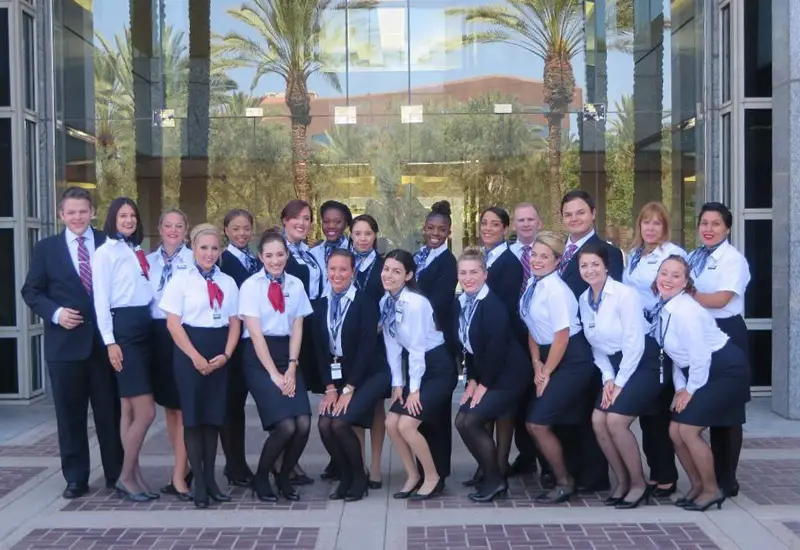
There has been a lot of talk about whether or not is it worth attending a flight attendant school.
Will they help you get the job or are they just a scam?
Some say that these schools just create false hope and are only in the business of promoting themselves and making money, while others find them useful in their quest for employment with an airline
So today we are covering the list of pros and cons of flight attendant schools.
PROS of Flight Attendant Schools
- They can be useful in helping people to understand the airline industry and to clear up any misconceptions they may have about a flight attendant’s job.
In a reputable school, they will learn how to prepare for the role, how to go about getting hired and to understand what to expect. - Many flight attendant schools have agreements with some regional or national airlines to coordinate your participation in any upcoming recruitment events and to have their students prioritized.
- They are beneficial for those that need more time to learn and assimilate new concepts in a short time. Once in an airline’s training program, everything will be very intensive and very fast, with daily exams and a lot of new material to study every day.
- They can help people be more prepared, not only for the interview but also for the course and the job itself.
CONS of Flight Attendant Schools
- You don’t need any previous flight attendant training. Airlines don’t actually require a cabin crew certification from these schools, they will train you in-house. Most of the time, the only educational requirement for the position of flight attendant is just a High School Diploma.
Note: Europe is the exception in terms of approved training schools.
In Europe, if you wish to work as a cabin crew member, you must hold a valid cabin crew attestation (License). This means that you can’t practice this profession without having been certified by an approved training school. So you will need to train for the position of cabin crew at an approved private school with the downside of not knowing if you will ever actually be hired by an airline.
But the good news is that nowadays there are more and more airlines that offer these cabin crew attestation (license) courses.
In Europe, it works like this:- Whether you have your Certificate or not you can apply for the position and go to the interview.
- If you get selected and you don’t have the Cabin crew attestation they will incorporate you into an initial cabin crew course to get the Cabin license first. You usually have to pay for this and it is as expensive as a course in a private school, but at least you know you’ll get hired after the course.
- Once you have the cabin crew attestation, you will need to pass another course that will be specifically about the airline. This course is called an Airline Conversion Course and is specifically designed for you to learn about the airline’s procedures, safety guidelines, service procedures, etc. The initial cabin crew attestation course content is of a more general nature than the conversion course.
- You won’t be asked at any point during your application or interview if you have completed a cabin crew course. Having a diploma from one of those schools will just be, “Ok, congratulations” but it doesn’t really guarantee anything.
- It will not help you get hired on the day of the interview. The interview is based on your performance, personality, how you fit the company’s culture. The flight attendant’s course will not increase your chances of getting the job.
- These private courses are usually quite expensive ($2,000 – $6,000), and most flight attendants have never been on one before getting hired. Save your money.
- They are a waste of time. They can last from 4 weeks to 9 months! There is no reason to spend such a large amount of time learning about our profession, you are far better off invest your time in preparing and rehearsing your interview skills instead.
What should you do?
Now that we have covered both pros and cons it’s up to you whether you decide to pay to go to a flight attendant school or not.
It’s down to personal choice.
But if you want to know my honest opinion, here’s what I would do:
- Do some research on the airline before the interview and thoroughly learn and understand what qualities they are looking for and expect of their flight attendants.
Nowadays you have everything you need online. When I first wanted to become cabin crew, many years ago we didn’t have access to such a large amount of information. So if you use your time wisely and do your research, you will already have a head start and an advantage. - Find out what the airline requirements are and how their interview process works, prepare a good resume, understand the company’s culture, prepare the most common cabin crew interview questions and practice, practice, practice your answers.
- Go in with a good attitude, show your personality, and demonstrate you are a team player, and you will be the equal of anyone who has attended an expensive flight attendant course.
In my opinion, you don’t really need to spend the money on a flight attendant’s course, but if you feel like it may help, then, by all means, go for it.
If you are the sort of person who gets really nervous or you have tried before but you were not successful, you may need this extra help.
Personally, I would avoid flight attendant schools, but I would ask for help from a cabin crew coach, someone with lots of experience and smarts who can give you the sort of information that is important and relevant. You’ll save a lot of money and it will be a far more personalized and helpful experience.



